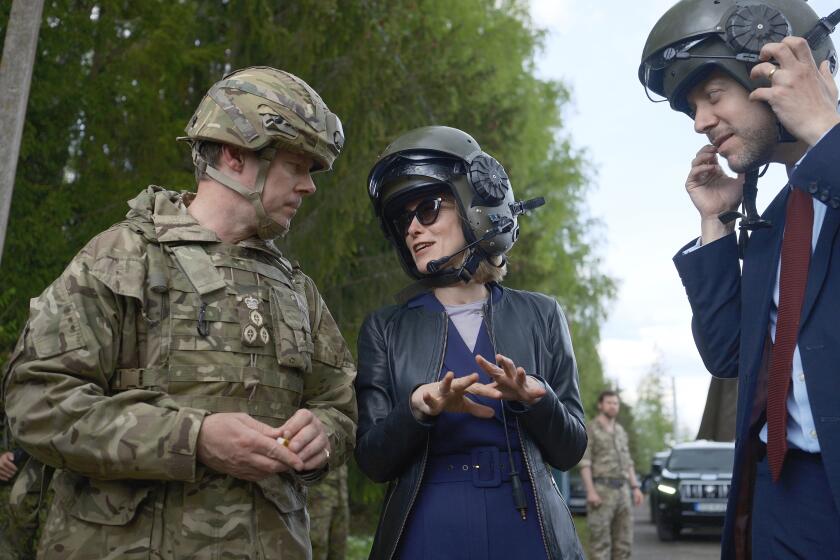In Florida’s War Against Canker, Judge Squashes Seeds of Tyranny
For retiree Jack Haire and his wife, one of life’s daily joys is their citrus trees: orange, grapefruit, tangerine and Key lime. The 10 trees on their half-acre property give shade, shelter for butterflies, and in season, a bounty of juicy fruit.
That’s why Patty Haire, 54, was even willing to risk arrest to protect them after state agricultural officials announced that the Haires’ home was in a “kill zone,” where all citrus trees would be destroyed to prevent the spread of a disease called citrus canker, a threat to the state’s $9-billion-a-year citrus industry.
When state inspectors knocked on their door, Haire insisted no one was going to come near her healthy trees, her husband recalled. “I said to my wife, ‘The worst thing is that we could lose our trees,’” he said. “My wife said, ‘No, the worst is that these people will be back for years trespassing on our property and interrupting our privacy.’”
On Friday, a judge agreed with the Fort Lauderdale couple that the state has been outrageously high-handed in its battle against citrus canker.
In language reminiscent of the American colonists’ grievances against King George III, Broward County Circuit Judge Leonard Fleet declared that Florida’s program to eradicate the disease “returns the state to a period of time when the rights of an individual were at the mercy of a whim of royalty.”
Since 1995, after the disease was found in a single tree near Miami International Airport, nearly 600,000 trees in Floridians’ yards and 1.5 million in commercial groves have been cut down by the state, according to the Florida Department of Agriculture. California’s citrus industry has escaped the disease, which prospers in more moist climates.
In his 20-page decision, Fleet ruled that a law that gives Florida the right to cut down healthy trees--passed this year by the Legislature and signed by Gov. Jeb Bush--violates the state Constitution and the 4th Amendment’s protection against unreasonable searches and seizures.
In particular, Fleet objected to a provision that allowed cutting crews to work under blanket search warrants that covered entire counties, giving them the power to enter anyone’s yard and fell all citrus trees, sick or not, within 1,900 feet of any one infected tree.
Fleet’s ruling appears to apply only to his jurisdiction, but an expected appeal could affect the policy statewide.
The removal of trees has been stopped occasionally by lawsuits, and some property owners have taken up arms to protect their trees from the state’s chain saws.
The Haires, whose lawsuit was joined by Broward County and other municipalities, were delighted by Fleet’s decision. So was another co-plaintiff, Laz Schneider, a Fort Lauderdale lawyer who has two large grapefruit trees, both more than 30 years old, that provide welcome backyard shade.
“My focus has shifted from the trees to the totally outrageous act of our Legislature and governor in attempting, as best as I can determine, to abolish the Bill of Rights,” Schneider said. “What the statute and [Florida Agriculture] Department are doing is taking property without due process of law. They are performing searches and seizures without due process of law.”
For Florida’s agricultural interests, the decision was a bruising setback, and the Department of Agriculture said it will try to have an appeal heard immediately by the state Supreme Court. Terence McElroy, the department’s spokesman in Tallahassee, said Fleet’s reasoning was the equivalent of allowing Typhoid Mary to keep her job in the restaurant trade.
“The rights of a relative few,” McElroy said, were prized over the interests of the single biggest sector of Florida’s agriculture industry, one that employs more than 100,000 people. Legal challenges to the eradication efforts and resulting court injunctions, he said, have resulted in increasing numbers of infected and at-risk trees in South Florida’s Broward and Miami-Dade counties, climbing from as many as 80,000 in 2000 to 200,000 today. The canker also has spread north to Palm Beach County.
Citrus canker is a bacteria that produces dark, oily lesions on leaves and fruit, weakening the tree and sapping its capacity to bear fruit. It has no known ill effects on humans, but makes oranges and other citrus look unappealing to consumers. According to the state Agriculture Department, the canker, which is spread by wind, has devastated the production of Key limes, a traditional Florida delicacy, in Miami-Dade County. Grapefruit trees also are very susceptible, as are some varieties of oranges.
Larry Galinkin, 59, who owns a tree nursery in Delray Beach in Palm Beach County, said the homeowners who sued are selfish. “They only care about their one tree,” he said.
In the yard of his suburban Fort Lauderdale home, he has grapefruit, orange and calamondin orange trees. “We are better in the long run killing everything that has the canker,” he said.
Andrew Meyers, an attorney for Broward County, claimed the law passed this spring, which validated the state’s practice of cutting down trees since 1995, was the creation of the powerful citrus growers and their allies in the Agriculture Department.
Initially, he said, the department acted by administrative fiat in cutting trees within 125 feet of a sick tree. When those actions were challenged in court, he said, growers prevailed on legislators to pass the law authorizing destruction on a much wider scale.
“Their whole policy is based on junk science,” Meyers said. “In fact, we proved at the hearing that the way they cut down trees actually spreads the disease.”
Under Fleet’s decision, Florida must compensate tree owners for disease-free trees that were felled. He said a jury could determine their worth. He also said that, in the future, warrants must be restricted to a specific property.
For the Haires, the ruling was a welcome reprieve for their trees, though they expect court battles to continue. “I’ve lived here for 37 years, and some of those trees were planted by my children,” said Jack Haire, 67. “It’d be devastating, going out there and seeing just vacant space.”
More to Read
Start your day right
Sign up for Essential California for news, features and recommendations from the L.A. Times and beyond in your inbox six days a week.
You may occasionally receive promotional content from the Los Angeles Times.






